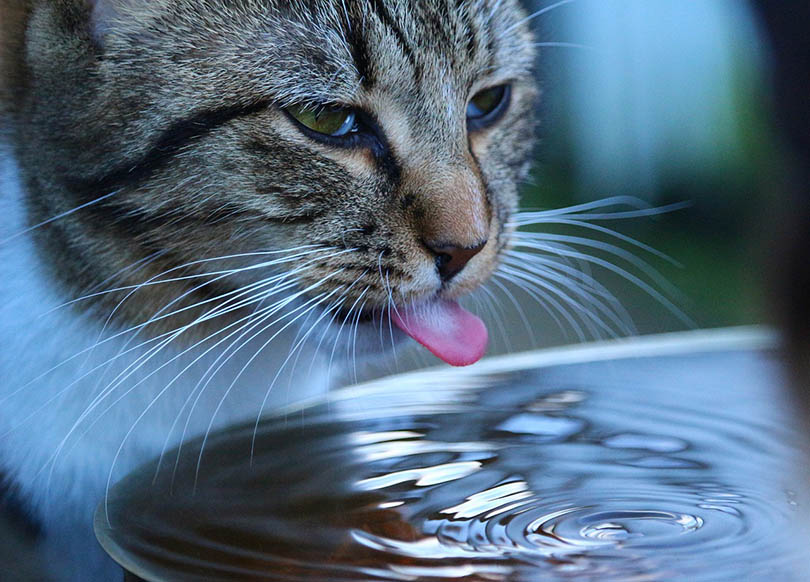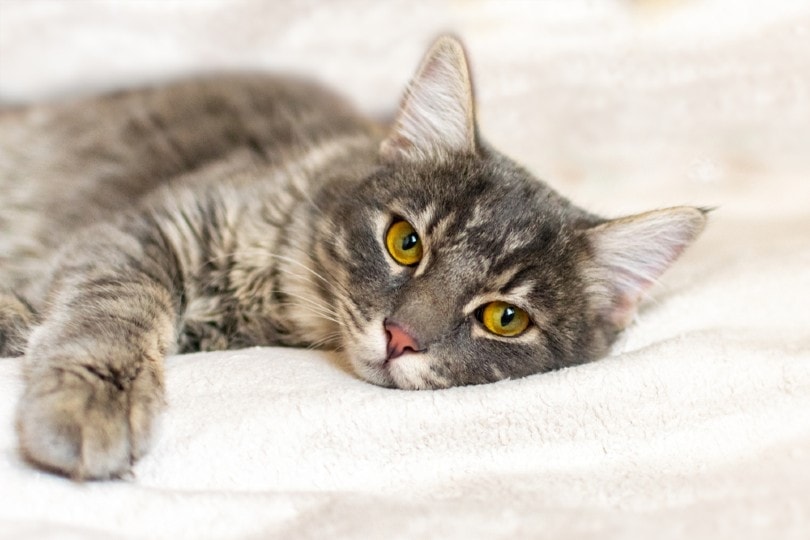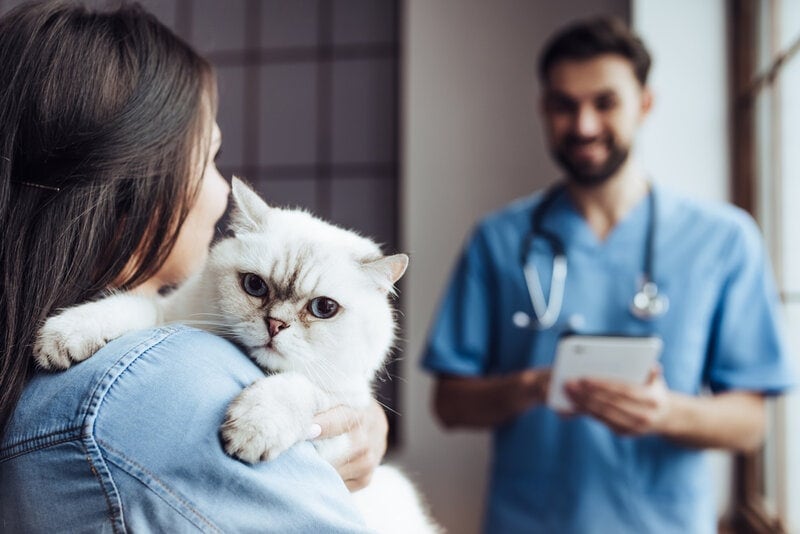Why Did My Cat Throw Up Clear Liquid? 7 Vet-Reviewed Reasons
Updated on
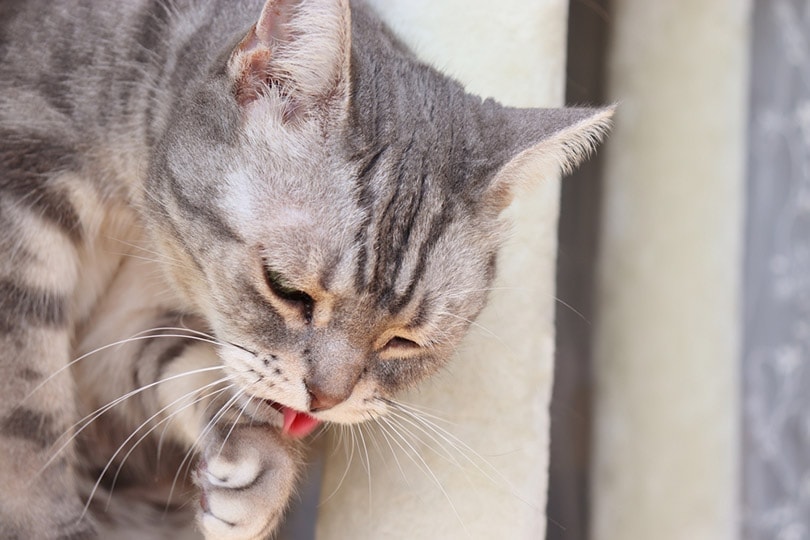
Vomiting in cats is not normal and should always be investigated further to determine the root cause. Throwing up a clear liquid can mean your cat is struggling with a serious illness or just that they have gone too long in between meals.
It’s always best to err on the side of caution and have your cat examined by your vet if they begin displaying concerning symptoms such as vomiting clear liquid. But if you’re waiting for an appointment and are driving yourself mad with worry over what the cause of your cat’s vomit is, keep reading. We’re going to review several potential reasons your cat is throwing up clear liquid and what you can do to help.
Why Did My Cat Throw Up Clear Liquid? 7 Possible Reasons
1. They Drank Too Much
Your cat may be vomiting up clear liquid because they’ve drank too much water, or they’ve drunk it too fast. This is likely to happen immediately after they’ve finished having their drink. If it’s been a while since they’ve last had a drink, it is unlikely that what they’re throwing up is plain water. Sometimes when you see a puddle of clear liquid on the floor, it also contains your cat’s stomach fluid and mucus from their esophagus.
2. They Have Parasites
Gastrointestinal parasites are a common problem many cat owners face, with some estimates suggesting that the prevalence rates are as high as 45% in some areas.
There are two main types of parasites your cat can come into contact with: protozoan parasites and wormlike parasites.
Protozoan parasites include coccidia, giardia, and toxoplasma, while wormlike parasites include hookworms, tapeworms, roundworms, and stomach worms.
Parasites can cause a lot of non-specific symptoms like:
- Coughing
- Diarrhea
- Vomiting
- Mucousy feces
- Anorexia
- Dehydration
- Constipation
- Black or tarry feces
- Weight loss
Some of these parasites can be passed onto humans, so it is essential to get treatment for your cat if you notice throwing up clear liquid and displaying other concerning symptoms.
3. They Have Hairballs
Cats are very clean animals and can spend up to half their day grooming themselves. As you can imagine, when they spend that much time licking their fur, some of it is going to wind up in their stomachs. The vast majority of the loose and dead hair your cat grooms off of himself will pass through the digestive tract without any issues. Occasionally, the hair will stay in the stomach and form a hairball that your cat will then need to pass.
When it comes time to pass the hairball, cats will often vomit up a clear liquid before the hair comes out. It’s normal to throw up hairballs sometimes, but they shouldn’t be frequent or painful.
Grooming your cat on a regular schedule can help reduce the occurrence of hairballs. If your kitty struggles with them often, you might consider a specialized diet designed to prevent hairballs.
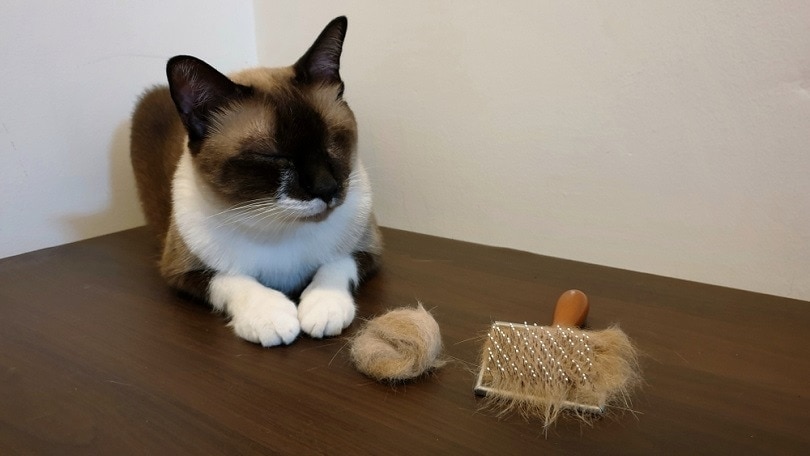
4. They Have Indigestion
Just like humans, cats can suffer from stomach aches. Their stomachs produce gastric juices and hydrochloric acid to help them digest their food. If something occurs that causes these juices to build up in your cat’s stomach, they’ll start to suffer from indigestion. Several things can cause indigestion.
If your cat isn’t eating enough food or if you’re waiting too long between meals to feed them, your cat may start vomiting clear liquid or white foam. This is because they’re hungry, and since their stomach doesn’t have any food in it, the acid that it’s producing will cause irritation.
Not transitioning your cat to a new food can cause stomach upset and could be the cause of clear vomit. If you’re changing your cat’s regular food out, you must do the transition slowly to prevent any gastrointestinal issues.
If you and your vet suspect your cat is vomiting clear liquid due to indigestion, you might consider feeding them smaller and more frequent meals. This can help prevent any stomach acid build-up that could potentially lead to vomiting.
5. They Ingested Poison
Ingesting poison can cause both clear and foam vomit. There are a lot of hazards around your home that you might even think of, such as poisonous plants, medication, antifreeze, rodenticides, and even certain human foods.
If you know your cat has eaten something it shouldn’t, you need to visit the vet as soon as possible. You might also consider calling the Pet Poison Hotline for advice while you’re on the way to the vet. You can reach the hotline 24/7/365 at (855) 764-7661. Please note that there is a $75 incident fee that will apply.

6. They Ingested a Foreign Object
Cats are curious little creatures who can get themselves into a lot of trouble. They are notorious for eating things they shouldn’t, like hair ties, paper, rubber bands, and yarn. If your cat has eaten a foreign object that is unable to pass through its digestive tract, it may lead to life-threatening blockages. Your cat may first start vomiting clear liquid to let you know that something isn’t right. You will also notice symptoms such as lethargy, anorexia, abdominal discomfort, and constipation.
If you suspect your cat has ingested a foreign object, it needs to be seen by your vet as soon as possible. Blockages often require surgery to fix.
7. They Have a Health Condition
There are several serious and not-so-serious health conditions that could be causing clear vomit.
Your cat may have a thyroid problem such as hyperthyroidism. Other symptoms to look out for include diarrhea, hyperactivity, drinking more than usual, and an unkempt coat. Your vet can diagnose hyperthyroidism through physical examination and blood tests. Treatment for this condition can include oral medication.
Diabetes mellitus is another condition that could cause clear vomit. Feline diabetes occurs when a cat’s body cannot produce or respond to insulin, causing elevated sugar glucose levels in the blood. Other symptoms of diabetes include excessive thirst, excessive urination, weight loss, and increased thirst.
Gastroenteritis and irritable bowel syndrome are stomach conditions that can also cause a white and foamy vomit. Your vet might have suggestions for a specific diet to help alleviate the symptoms of these conditions.
When Should I See the Vet?
If they’ve only thrown up clear liquid once, or if the liquid is surrounded by a hairball or some of their food, you likely don’t have much to worry about.
If the vomiting becomes frequent or your cat is clearly in distress as they’re throwing up, it’s time to visit your vet. There may be a completely innocuous reason for their clear vomit, but it’s always best to check in with the doctor for peace of mind.
Come to the vet prepared to answer questions. They will want to know details about your cat’s diet, how much they drink, what their litter box habits are like, and what other symptoms you’ve noticed them displaying.
They will do a physical examination of your cat’s body, and an external abdomen check to see if they notice anything concerning. Your vet will likely order additional tests like blood work or ultrasounds to gather a better understanding of what could be causing the vomiting.
Depending on what your vet finds during his examination, your cat might need to stay in the hospital to receive fluid therapy or supportive care.
Final Thoughts
As you can see, many potential causes for your cat’s clear vomit. While many of the reasons are innocent, sometimes the vomiting can be indicative of a more serious condition. Never hesitate to reach out to your vet if you’re ever concerned about your cat’s behavior.
Featured Image Credit: chie hidaka, Shutterstock

